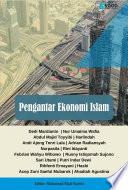
Pengantar Ekonomi Islam
Kegiatan ekonomi dalam ajaran Islam, sangat menarik untuk selalu dikaji. Buku ini dikembangkan berdasarkan pada konsep dasar ekonomi Islam yang lahir bukan sebagai sebuah pengetahuan baru.Ekonomi Islam merupakan sebuah konsep keilmuan Islam yang telah dipraktekkan sejak masa Rasulullah yang dilanjutkan oleh para sahabatnya yang dibingkai dalam konteks sains ekonomi modern. Kandungan yang ada pada buku ini berisikan pembahasan mengenai: konsep dasar ekonomi Islam, sejarah pemikiran ekonomi Islam, fiqih ekonomi kontemporer, landasan hukum ekonomi Islam, jenis akad dalam ekonomi Islam, konsep teori permintaan dan penawaran dalam ekonomi Islam, produksi dalam ekonomi Islam, konsumsi dalam ekonomi Islam, distribusi dalam ekonomi Islam, kebijakan fiskal dalam ekonomi Islam, kebijakan moneter dalam ekonomi Islam, konsep uang dalam ekonomi Islam, mekanisme pasar dalam ekonomi Islam, pasar modal syariah, wakaf dan ekonomi Islam di Indonesia.
- ISBN 13 : 6230907801
- ISBN 10 : 9786230907807
- Judul : Pengantar Ekonomi Islam
- Pengarang : Dedi Mardianto, Nur Umaima Wafia, Abdul Majid Toyyibi, Harlindah, Andi Ajeng Tenri Lala, Adrian Radiansyah, Nurpasila, Rini Idayanti, Febrian Wahyu Wibowo, Rusny Istiqomah Sujono, Sari Utami, Putri Indar Dewi, Rihfenti Ernayani, Hasbi, Acep Zoni Saeful Mubarok, Ahadiah Agustina, Nur Umaima Wafia, Abdul Majid Toyyibi, Harlindah, Andi Ajeng Tenri Lala, Adrian Radiansyah, Nurpasila, Rini Idayanti, Febrian Wahyu Wibowo, Rusny Istiqomah Sujono, Sari Utami, Putri Indar Dewi, Rihfenti Ernayani, Hasbi, Acep Zoni Saeful Mubarok, Ahadiah Agustina, Nur Umaima Wafia, Abdul Majid Toyyibi, Harlindah, Andi Ajeng Tenri Lala, Adrian Radiansyah, Nurpasila, Rini Idayanti, Febrian Wahyu Wibowo, Rusny Istiqomah Sujono, Sari Utami, Putri Indar Dewi, Rihfenti Ernayani, Hasbi, Acep Zoni Saeful Mubarok, Ahadiah Agustina, Nur Umaima Wafia, Abdul Majid Toyyibi, Harlindah, Andi Ajeng Tenri Lala, Adrian Radiansyah, Nurpasila, Rini Idayanti, Febrian Wahyu Wibowo, Rusny Istiqomah Sujono, Sari Utami, Putri Indar Dewi, Rihfenti Ernayani, Hasbi, Acep Zoni Saeful Mubarok, Ahadiah Agustina, Nur Umaima Wafia, Abdul Majid Toyyibi, Harlindah, Andi Ajeng Tenri Lala, Adrian Radiansyah, Nurpasila, Rini Idayanti, Febrian Wahyu Wibowo, Rusny Istiqomah Sujono, Sari Utami, Putri Indar Dewi, Rihfenti Ernayani, Hasbi, Acep Zoni Saeful Mubarok, Ahadiah Agustina, Dedi Mardianto, Nur Umaima Wafia, Abdul Majid Toyyibi, Harlindah, Andi Ajeng Tenri Lala, Adrian Radiansyah, Nurpasila, Rini Idayanti, Febrian Wahyu Wibowo, Rusny Istiqomah Sujono, Sari Utami, Putri Indar Dewi, Rihfenti Ernayani, Hasbi, Acep Zoni Saeful Mubarok, Ahadiah Agustina, Nur Umaima Wafia, Abdul Majid Toyyibi, Harlindah, Andi Ajeng Tenri Lala, Adrian Radiansyah, Nurpasila, Rini Idayanti, Febrian Wahyu Wibowo, Rusny Istiqomah Sujono, Sari Utami, Putri Indar Dewi, Rihfenti Ernayani, Hasbi, Acep Zoni Saeful Mubarok, Ahadiah Agustina, Nur Umaima Wafia, Abdul Majid Toyyibi, Harlindah, Andi Ajeng Tenri Lala, Adrian Radiansyah, Nurpasila, Rini Idayanti, Febrian Wahyu Wibowo, Rusny Istiqomah Sujono, Sari Utami, Putri Indar Dewi, Rihfenti Ernayani, Hasbi, Acep Zoni Saeful Mubarok, Ahadiah Agustina, Nur Umaima Wafia, Abdul Majid Toyyibi, Harlindah, Andi Ajeng Tenri Lala, Adrian Radiansyah, Nurpasila, Rini Idayanti, Febrian Wahyu Wibowo, Rusny Istiqomah Sujono, Sari Utami, Putri Indar Dewi, Rihfenti Ernayani, Hasbi, Acep Zoni Saeful Mubarok, Ahadiah Agustina, Nur Umaima Wafia, Abdul Majid Toyyibi, Harlindah, Andi Ajeng Tenri Lala, Adrian Radiansyah, Nurpasila, Rini Idayanti, Febrian Wahyu Wibowo, Rusny Istiqomah Sujono, Sari Utami, Putri Indar Dewi, Rihfenti Ernayani, Hasbi, Acep Zoni Saeful Mubarok, Ahadiah Agustina,
- Kategori : Business & Economics
- Penerbit : Sada Kurnia Pustaka
- Bahasa : id
- Tahun : 2022
- Halaman : 257
- Google Book : https://play.google.com/store/books/details?id=WyCcEAAAQBAJ&source=gbs_api
-
Ketersediaan :
Kegiatan ekonomi dalam ajaran Islam, sangat menarik untuk selalu dikaji.





